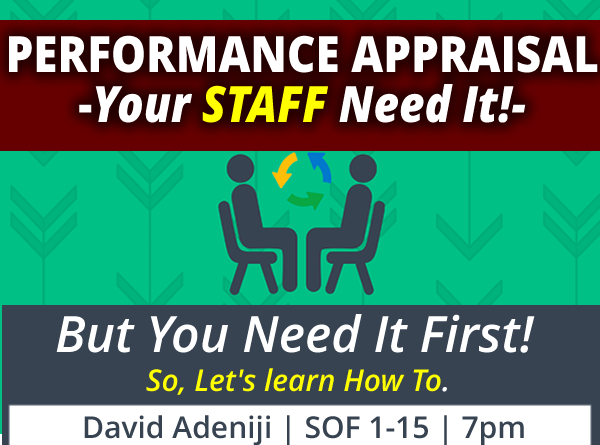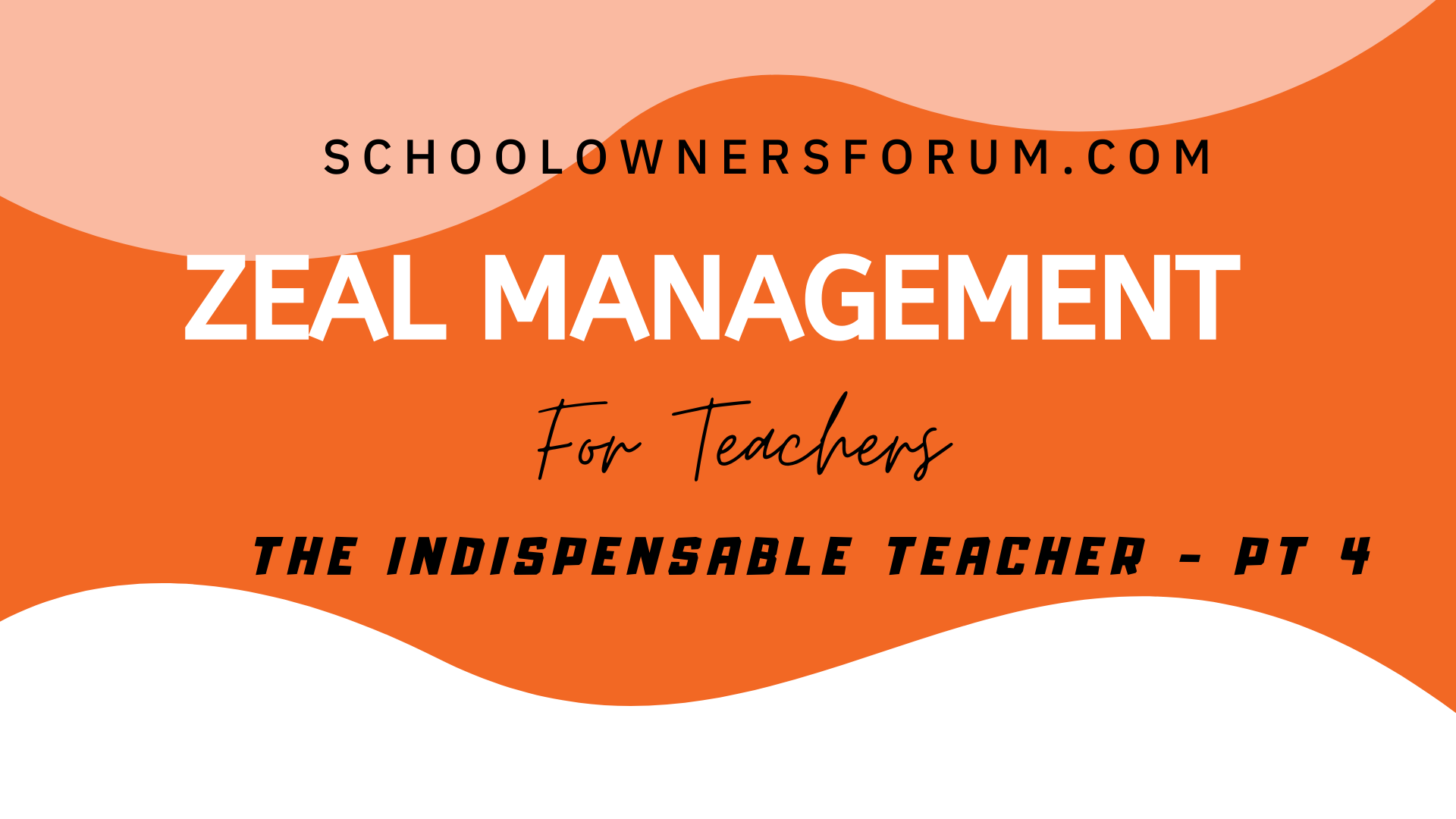PERFORMANCE APPRAISAL
Ever wondered why many African businesses fail to transit from one generation to another? The reason is that we’re still learning to do business. Institutions set up to help us do well are also still in their learning stages. What this intro has to do with tonight’s class is that we seldom worry about little things . we think they don’t count for much. We only want to be seen solving BIG issues. Issues that appear to deal directly with how money comes or how it is spent.
Good a thing we all have schools and however challenging it is now, we’re either enjoying our freedom, or we’ve once enjoyed it. The feedom that comes from owning a business that pays people every month. Let’s thank God for it. We can bask a little, a few times in the euphoira of this reality. But then, the other realities will soon start begging for attention, as they always continually do. How do we respond.
PERFORMANCE APPRAISAL
There will always be performance, poor or splendid, there will always be activity. The results we’re getting may not be commensurate with the efforts seen to be put in, but everyone is always seen to be doing something. The one who pays the bills knows where the load is heavy and feels the pain of all unproductive efforts, and this is where performance appraisal becomes inevbitable. ARE THEY REALLY FULFILLING THEIR CONTRACT? WHAT’S THE CONTRACT BY THE WAY? Just teach and get paid? They don’t have that answer. You do!
Let’s be truthful, school owners are seldom guilty of performing their statutory duties. In my own opinion, they even do so much, or let’s say, too much. The exact area where they need to appraise themselves is the very point I will begin with.
So Who’s Fault Is It When You Aren’t Getting Results Commensurate With Your Input And Expectations? Your fault? Your Staffs Fault? Your Parents Fault? Nigeria’s Fault? Who’s to Blame?
1. If you blame Nigeria, it’s emotionally soothing and convenient, but to what end?
2. If you blame your parents, it’s like talking to the air, who I cares, you’re not the only school in town.
3. If you blame your staff, How I wish that’ll change them. It helps them though, but that will not swap your liabilities. Like it or not, It’s your estate, not totally theirs. Their only helpers.
4. If you blame yourself too much, tour should be careful be careful not to compound your headaches. You already have enough!
5. In essence, I’m saying, don’t blame anyone, save that energy to rearrange the woods burning in the fire. Begin by appraising every stakeholders position.
HEAR THIS:
95% of school owners didn’t attend any school that trained them how to run a school. I actually don’t think anyone did. We all chanced oin it. There are 3 broad categories of school owners.
CATEGORY 1: I have teaching experience, and I have passion then I started a school
CATEGORY 2: There’s money in school business, (an i phave passion for it) so I invested in it
CATEGORY 3: CATEGORY 1 + CATEGORY 2
Whichever category you fall, I can almost confirm you didn’t attend any school owners’ college. That’s the foundation of most of the problems we have. So when we talk about Performance Appraisal, it sounds like a corporate business phenomenon, right? And even if you do it. How? What’s the intention? What are the results? But honestly. Its a powerful management tool. Performance appraisal helps to expose staff out of their hiding places and make them value themselves before you place value on them! If you appraise YOURSELF often, you’d need little of training!
*ANYWAY, whichever CATEGORY you fall into, SOF ACADEMY (RC 1538789) is starting a SCHOOL OWNER’S SCHOOL sort of, beginning from next year. Please let’s tell our friends who’re itching to fly their new school to PAUSE a little bit and come and learn HOW TO RUN A SCHOOL. And we who’ve already started a school. THE TRANSFORMER’S COURSE is for us, it’s a 5 months courses!
SO WHAT IS PERFORMANCE APPRAISAL?
Performance Appraisal is when you set up a mechanism to measure your staff’s actual performace compared with the preset (and understood) expectation, then get them to score and push themselves based on those performance indicators. Easy to understand as stated, isn’t it? The new problem is…We’re talking about school here, with it’s uncertainties and it’s peculiarities, where things are not really what they seem to be.
WHO DO YOU EXPECT?
At times, it appears as if your people aren’t performing as expected. The question is: What is the expected? Are you clear on that? Is it realistic? If you know what you expect, do they know too? If you’re both clear on BOTH parties’ expectations from the other, then we can begin to talk about performance appraisal.
More often, I see schools employ teachers/staff simply because there definitely has to be people handling subjects and classes and posts as that’s the norm everywhere. And parents will of course not give you children if they have the slightest hint that you don’t have hands for key subjects or that your hands are not sound. That’s correct. _Isn’t it?
Now here is my point. Do you design an expectation ( or Job Portfolio) for the teacher before bringing them on board? Or say, even after they’ve come in. They have a sure banker expectation from you monthly. But you are not permitted you make demands on them Right?. Yes you have the very obvious idea of what he/she should do – handle the class or handle the subject or some other job as the case may be – but do you have that job roles and they KEY PERFORMANCE INDICATORS written down?. (Don’t be scared. We’ll break that down shortly) What’s contained in it (we shall soon see that)? Was it communicated in detail to the fellow at the point of employment.
PERFORMANCE CAN ONLY BE MEASURED AGAINST PRE-COMMUNICATED AND UNDERATOOD EXPECTATIONS, NOT ASSUMPTIONS!
The Party’s over. No one should be permitted to coast in your boat and just pass the time and enjoy exploit your benevolence without visible impacts. Close your eyes and imagine if a particular staff (or executive) of yours was not there. Will business suffer in any way? If the answer is not an emphatic yes, please quickly set up a performance appraisal session with him or her. Resources are lean, performance ius key
CLEAR (NOT ORAL) DEFINITION OF JOB ROLES FOR EVERY TEACHER YOU HAVE.
If you don’t have that before now, you can do it now. If you have just one teacher in your school, wake up very early tomorrow morning and pen down what her role should be – those she’s been doing, and the ones you’ve not been bold enough to demand because you think you don’t have enough to pay yet.
And if you have many teachers in your school and they don’t have clearly defined and written down job roles apart from the popular handle the subject or handle the class job, then find time to do it.
It is after you have defined a teacher’s job roles that you can determine how responsible she is. A few times you just know a teacher is not responsible enough, but to what extent is that irresponsibility and to what level will you be able to communicate to her her present level of responsibility or irresponsibility if you don’t have clearly articulated job roles for the fellow.
MIS-COMMUNICATION OR UNDER-COMMUNICATION
“Mrs Xyz, you’ve been here for more than a year and your children cannot not speak correct tenses.”
“But ma, I’m trying my best.”*
How do we define that best? Most times school owners are either too busy to put things into writing, communicate their thoughts in clear terms, and keep proper documents or maybe too old to keep up with changing times. We run the school mostly on conventional assumptions, head knowledge, and moral expectations than on principles.
Also many times, our intentions for and expectations from our teachers do not align with their own intentions for and expectations from us. We’re humans and so are our employees. If you nurse lofty intentions for your teachers, please let them know it even while you’ve not executed it. Don’t always wait pull surprises. They may be too late. If you’d soon begin to provide lunch every afternoon for everyone, please tell them now. If you’re dreaming of acquiring an estate somewhere for teachers to have a piece of land each to their name, please tell them while it’s still in the making.
However if you’re looking out for a particular level of commitment and output from the teacher, also don’t keep it to your self, don’t grudge it, and don’t simply assume she’s supposed to know that. Now, no matter how dear a teacher is to you, let her job roles be known. Let them be clear. Exceptional teachers will still exceed the definition of their roles. They will go the extra mile. Let there be a balance between familiarity, and formality. If possible, let the later take precedence. You’re doing the teacher a favour by being strict.
EXAMPLE OF A MATHEMATICS/SCIENCE HOD JOB ROLE (OR DESCRIPTION)
1. Teach mathematics and other related subjects that may be assigned within the agreed working periods and specified students.
2. Supervise and mentor other teachers in the department for effective compliance and execution of their own job roles while at the same time raise leaders among them for future similar roles.
2. Engage the children, Increase their enthusiasm for the subject and institute the School’s Jet Club
3. Organize at least once a session through the Jet Club or other initiatives, a mathematics competition that will have other schools compete for a prize
4. Contribute to the marketing team’s lead generation pool through such events and other initiatives
5. Ensure adequate preparation of students for external exams and ensure performances in Mathematics and the sciences, not below the school’s previous ratings
6. Assist the Vice Principal in the coordination of the school’s Relationship Management Team.
7. Over time, contribute to and complete the school’s standardized content for the secondary section mathematics curriculum. This is always a continuous exercise, but could be completed in phases.
“`8. Creativity is allowed and expected in all of these roles. You’re also obliged/allowed to exceed the given expectations.
Let the job roles be clear on both ACTIVITIES and OUTCOMES. Very Important: Both
Prepare for each teacher. It’s important
This should not only be done when employing the teacher, it should be reviewed and revised from time to time. Not only during appraisals or only when something is observed not to be right, but regularly as a culture of interaction between you and your teachers.
Just as the school workforce is a dynamic one – teachers come and go – so should everyone’s job roles. They should change as the occasion demands. Responsibilities should be removed and added reasonably as we go on, but one thing should be ensured – that it is always written down and communicated adequately with the teacher.
I’ve seen that the major reasons why teachers don’t live up to their cost, is that their employers are not prepared for them. You want someone to deliver but you’re not prepared to pay the price for that. That price begins with sitting down and thinking their job roles through, defining what your own input should be, identifying the obvious weaknesses they have and how both of you will address these.


